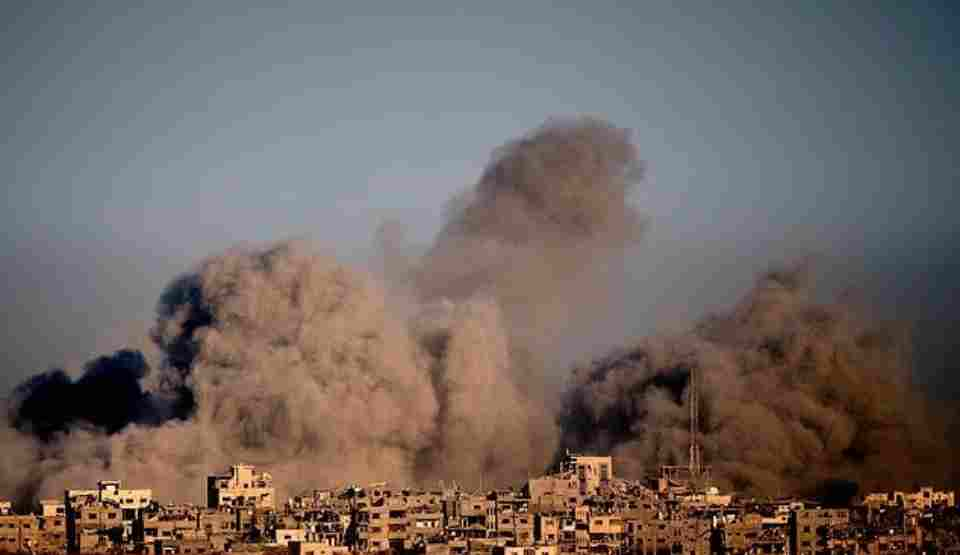Hamas has launched a major mobilization effort to restore its authority across Gaza, deploying approximately 7,000 security personnel to areas vacated by Israeli forces under the newly agreed ceasefire.
The militant organization issued urgent directives via phone calls and text messages, ordering members to report within 24 hours to designated locations. The messages declared a “general mobilization in response to the call of national and religious duty, to cleanse Gaza of outlaws and collaborators with Israel.”

Hamas security units, some in blue uniforms and others in plain clothes, have been photographed patrolling streets throughout the enclave. The group has appointed five new governors, all with military backgrounds, to oversee different districts.
The mobilization comes as tens of thousands of displaced Palestinians stream back to northern Gaza, many on foot along coastal roads, hoping to find their homes still standing. However, they face widespread devastation, particularly in Gaza City, where Israeli forces conducted intensive operations in recent weeks, demolishing high-rise buildings and residential structures.
The ceasefire, which took effect Friday, marks a potential turning point in the devastating two-year conflict that began with Hamas’s October 7, 2023 attack on Israel, which killed approximately 1,200 people and resulted in 251 hostages being taken.
Gaza’s Health Ministry reports that more than 67,000 Palestinians have been killed and nearly 170,000 wounded during Israel’s military response. The ministry, part of the Hamas-run government, states that roughly half of those killed were women and children. The United Nations and independent experts consider these figures the most reliable casualty estimates available.
Uncertainty Over Gaza’s Future Governance
Critical questions remain about Gaza’s post-war administration and whether Hamas will surrender its weapons, as stipulated in the ceasefire plan backed by former President Trump. Israeli Prime Minister Benjamin Netanyahu has warned that military operations could resume if Hamas refuses to disarm.
“If this is achieved the easy way — so be it. If not — it will be achieved the hard way,” Netanyahu stated Friday, emphasizing that subsequent phases must include Hamas’s disarmament and Gaza’s complete demilitarization.

Israeli forces continue maintaining defensive positions across approximately 50 percent of Gaza territory they still control after withdrawing to predetermined boundaries.
Humanitarian Crisis and Aid Operations
The United Nations received authorization from Israel to significantly increase aid deliveries beginning Sunday, according to a U.N. official speaking anonymously. The shipments aim to address severe malnutrition and famine conditions that developed during the conflict due to Israeli military operations and restrictions on humanitarian assistance.
Some 170,000 metric tons of aid have been pre-positioned in Jordan and Egypt, awaiting clearance to enter Gaza. U.N. spokesperson Stephane Dujarric confirmed Friday that fuel, medical supplies, and other essential materials have started flowing through the Kerem Shalom crossing.
The International Criminal Court is pursuing arrest warrants for Netanyahu and his former defense minister on allegations of using starvation as a weapon of war—charges Israeli officials firmly reject.
U.N. officials are pressing Israel to open additional border crossings and ensure safe passage for aid workers and returning civilians in areas recently subjected to heavy bombardment.
Hostage-Prisoner Exchange
Under the ceasefire terms, the remaining 48 hostages—approximately 20 believed to be alive—must be released by Monday. In exchange, Israel will free around 2,000 Palestinian prisoners.
However, a list published Friday notably excluded Marwan Barghouti, the most popular Palestinian leader and a figure many view as potentially capable of unifying Palestinian factions. Israel considers Barghouti and other prominent prisoners to be terrorists and has consistently refused to release them in previous exchanges.
The conflict has displaced roughly 90 percent of Gaza’s two million residents, many multiple times, and has triggered regional conflicts, global protests, and genocide allegations that Israel denies.






